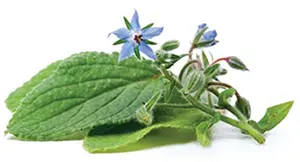
Introduction
Borage, or Borago officinalis, commonly known as starflower, is an annual herb native to the Mediterranean. It is distinguished by its striking blue or purplish star-shaped flowers, bristly stems, and leaves. The entire plant is edible, but the flowers are particularly noted for their cucumber-like flavor, offering a cool and refreshing essence. The term ‘borage’ is believed to originate from the Arabic ‘abu araq’, translating to “source of sweat,” a nod to its sudorific properties that stimulate sweat glands to cool the body.
Historical Significance and Lore
Pliny the Elder, a Roman naturalist and philosopher, famously stated that borage “maketh a man merry and joyful.” This herb has a storied history, including a belief that it was the nepenthe mentioned in Homer’s Odyssey, a mythical drug that erases sorrow. In medieval times, borage flowers steeped in wine were used as a remedy for melancholy.
Culinary and Therapeutic Uses
Borage flower essence is primarily known as a courage enhancer, aiding in finding inner strength to face life’s challenges. It is thought to bring light and clarity in difficult times, soothe the heavyhearted, open the heart chakra, and release emotions that lead to depression, paving the way for optimism, enthusiasm, and joy. In culinary uses, borage provides a cooling effect and is a popular addition to summer drinks such as iced tea, lemonade, and fruit juices.
